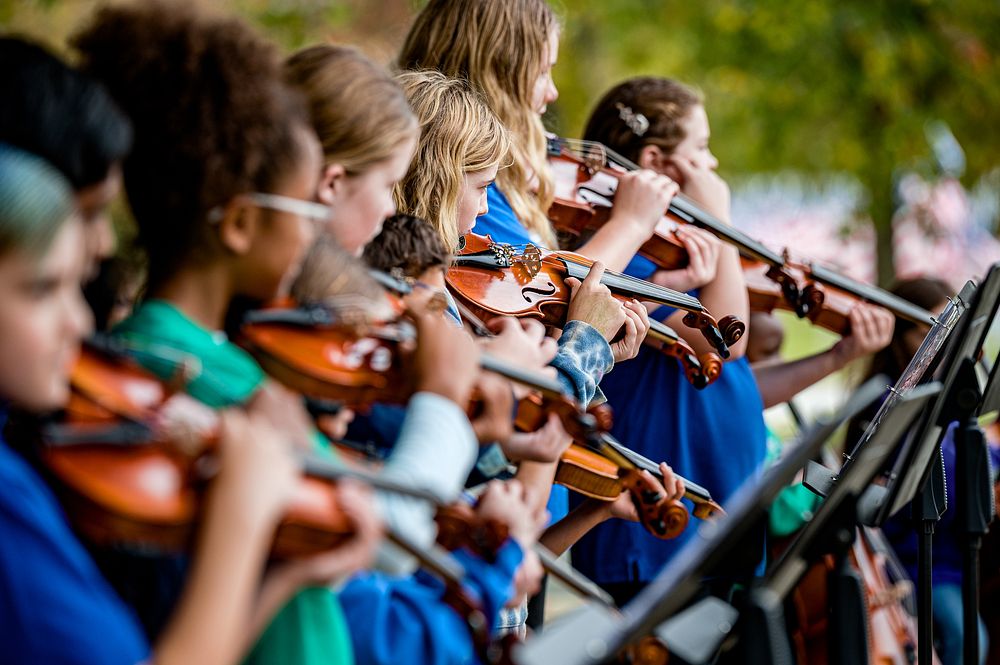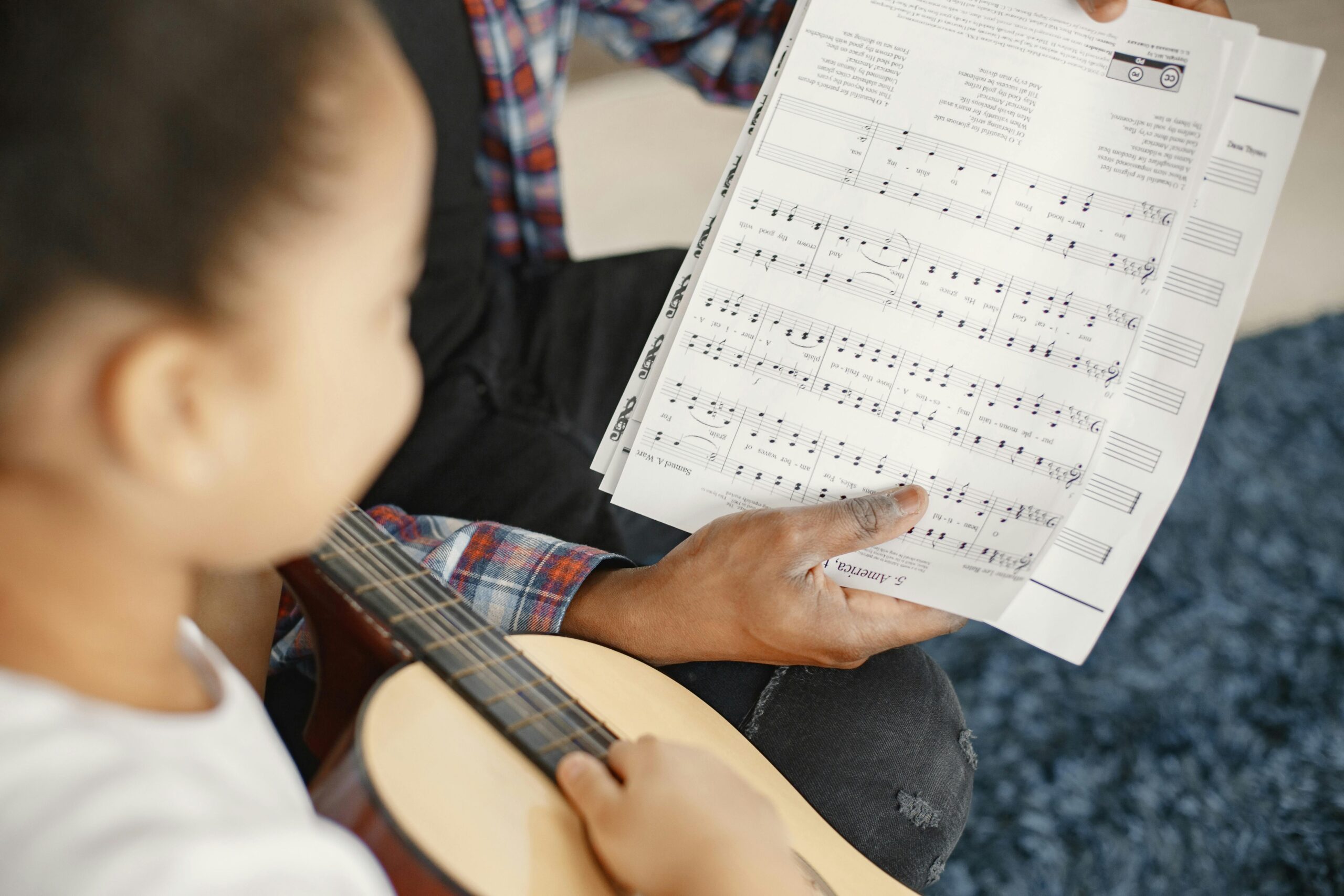Monday 17 March 2025
By Dubheasa Mullins
Co(l)laboratory PhD Candidate

Photo credit: The 2022 Community Youth Arts Festival
Why music matters
As I sit here, ready to fight for music’s place in education, I reflect on my years as a music teacher. I think of the success stories: students creating something beautiful they never thought possible, and the difficult moments when the spark of raw creativity was lost to rigid assessments.
I picture a whole primary school belting out Sunshine in My Heart in harmony, their voices filling the room with joy. I remember a socially awkward Year 9 student, finding confidence through music, finally able to express themselves. And I think of long-standing resources like Singing Matters or Composing Matters, titles that hint at the ongoing struggle to justify music’s place in schools—a battle music educators have fought for decades.
It’s a battle I fought too, for nearly twenty years—one that, in the end, wore me down enough to leave the profession. But I haven’t walked away from the fight. Now, I’m doing a PhD to understand how music benefits children socially and cognitively, ensuring that its value is recognised. But why does music always need defending? Why is it sidelined when its benefits are clear? Some argue that other subjects take precedence – why bang a tambourine when a child needs extra phonics to improve their literacy skills?
Here’s why.

Music and child development: more than just banging drums
In my PhD research, I’m exploring how rhythmic entrainment (moving in time with a beat) and interpersonal synchrony (moving in time with others) shape children’s cognitive development, social connections, and wellbeing. After diving into the literature, one thing is clear: music isn’t just an enjoyable extra—it actively shapes how children think, connect, and grow.
Social development
From birth, we’re wired for music. It’s a deeply social experience that connects people, from babies bonding with caregivers to teenagers forming their identities.
Whether singing in a choir, playing in a band, or simply moving to the same beat, music fosters connection, cooperation, and a shared sense of purpose and achievement. It strengthens teamwork and communication, while also enhancing empathy. Studies show that synchronous musical activities activate the brain’s reward system, reinforcing social bonds and increasing prosocial behaviour.
At its core, music isn’t just an art form—it’s a necessity. Across cultures and throughout evolution, humans have integrated music into daily life, shaping how we connect with others and build communities.
Cognitive development
Music isn’t just something we hear, it’s something we do, engaging both the body and the brain. Learning to play an instrument strengthens the connection between hearing and movement, reshaping the brain over time. Musicians develop better coordination between the left and right sides of the brain, improved motor control, and enhanced timing and precision. But the benefits don’t stop there. Music training also strengthens skills such as working memory, attention, and self-control. Research even links it to improvements in reading and phonological processing, showing that rhythm and language are more connected than we might assume.
Therefore, even basic activities such as banging drums help to activate brain areas involved in learning phonics. Research on developmental conditions such as ADHD and autism suggests that difficulties with rhythm are linked to challenges in inhibitory control, but rhythm training can help. Studies show that rhythm interventions improve timing skills, strengthen brain connectivity, and reduce hyperactivity and inattention.
Beyond its musical benefits, learning an instrument is linked to academic achievement. Research suggests an association between musical training, higher IQ scores, and better school performance, but is this causation or correlation? It could be that children who have greater access to music lessons, also benefit from other academic advantages. Still, learning an instrument builds perseverance, discipline, and problem-solving, skills that can transfer across subjects. Over time, even small cognitive benefits add up, reinforcing the idea that music education nurtures more than just musical ability—it develops skills for life.
Wellbeing and emotional growth
Music shapes wellbeing from an early age. It helps children regulate their emotions and express feelings in ways words sometimes can’t. Music can lift moods or provide comfort, but its impact goes deeper; it builds confidence and resilience. Research shows that learning an instrument improves self-esteem. In a world where children’s wellbeing is increasingly under strain, music can be a tool for emotional development.
But music isn’t just about personal growth—it’s a lifeline for connection, helping to combat loneliness, which is a major risk factor for mental health issues. And it’s not just in our heads, music triggers the release of neurohormones such as oxytocin and endorphins, the same chemicals linked to social bonding and happiness. This is why group singing, drumming, and shared musical experiences can be so powerful—they create a sense of belonging and strengthen emotional wellbeing.

The big picture
Reports and news articles e.g., the BBC repeatedly highlight the benefits of music for children. Yet, despite overwhelming evidence, music education constantly needs defending. Take Wales, for example: Cardiff University has proposed closing its entire School of Music as part of cost-cutting measures, and the Royal Welsh College of Music & Drama has recently closed its Junior Conservatoire programme. Why is music always first in line for cuts, while maths and English remain untouchable? What message does that send to children about what really matters?
One of the biggest flaws in education policy is the outdated hierarchy of subjects, where the creative arts are seen as decorative rather than essential. The assumption? That literacy and numeracy are the only ‘serious’ pathways to success, while creativity is an indulgence. But this is a false divide. Creativity isn’t separate from intelligence—it’s a way of thinking, problem-solving, and engaging with the world, which are essential components of intelligence.
This brings me back to an unforgettable moment during my teacher training—watching Ken Robinson’s TED Talk, ‘Do Schools Kill Creativity?’. That was in 2006. Nearly two decades later, nothing has changed. Schools continue to prioritise memorisation over innovation, stifling creative thinking. As Robinson argued, children are taught to fear being wrong, and in doing so, they grow out of creativity instead of developing it. Yes, maths is important. But so is music. We need both.
When I was teaching, even the most academically driven students found value in music, analysing chords with the same precision they applied to solving equations. Music stretched them in ways other subjects couldn’t; it demanded both critical thinking and emotional expression. Music isn’t just an extra—it’s essential for children’s cognitive, social, and emotional development.
The problem isn’t just ignorance—it’s systemic, and the consequences filter down. If adults don’t value music, neither will children. If it’s treated as an afterthought, students won’t see its worth. We talk about preparing children for the future, but what kind of future are we shaping if we fail to nurture the whole child? We don’t know what children are capable of unless we expose them to everything. Every time it’s sidelined, we lose a powerful tool for learning, expression, and connection. If we want children to thrive, we must stop treating music as optional and start recognising its value.
What can we do?
Educators, how can we integrate music into the school day instead of letting it be squeezed out? Parents, how can we bring music into everyday life, making it a natural and accessible part of childhood? Policymakers, when will we stop cutting creative subjects and start seeing them as opportunities, not expendable extras?
Music matters. It’s time we fought for its place in children’s lives.
Dubheasa Mullins is a Co(l)laboratory PhD candidate.
- You can contact Dubheasa at dubheasa.mullins2023@my.ntu.ac.uk
- Learn more about Dubheasa through our Research Profiles
- Learn more about Dubheasa’s research here on their research project page
